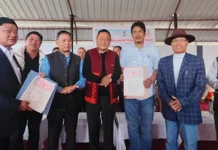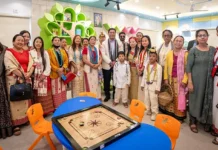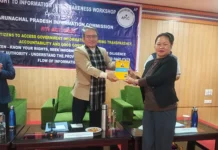ITANAGAR, 30 May: A focused gatekeepers’ training programme on suicide prevention was conducted on Friday at the Don Bosco Youth Centre (DBYC) here.
Organized by an Indian Council of Medical Research project team from the Arunachal Institute of Tribal Studies, Rajiv Gandhi University, in collaboration with the DBYC, the training programme brought together over 30 teachers, wardens and counsellors from
seven schools – Auxilium Public School, Eklavya Public School, Pobi Memorial School, Elite Residential School, JP Public School, Agape Public School, and Model English School – with the aim of equipping the participants with essential skills to identify, provide support, and refer individuals at risk of suicide to mental health professionals.
Addressing the participants, DBYC director Father Sunny highlighted the importance of community-led mental health initiatives and the powerful role of trained gatekeepers.
The sessions began with an ice-breaking activity called the ‘Strengths Game’, designed to foster connection and set a collaborative tone. Project Research Scientist-I Chara Lowangcha led the initial technical sessions, guiding participants through an understanding of suicide, the responsibilities of a gatekeeper, and how to recognize both risk and protective factors. She also addressed precipitating factors and emerging challenges affecting mental health today.
In the second session, Dr Tuyir Riba facilitated a dynamic segment on effective communication skills. Through interactive group activities and role-plays, the participants practiced empathetic listening, appropriate response techniques, and how to approach individuals showing signs of distress.
Mayuri and Dr Leeyir Ete co-facilitated a session on assessing suicide risk, followed by a practical session on intervention strategies by emphasizing how to respond effectively and connect individuals to the appropriate mental health support systems.
The day was marked by high engagement, powerful reflections, and hands-on learning, leaving the participants empowered and ready to take proactive roles in suicide prevention efforts across their institutions and communities.




